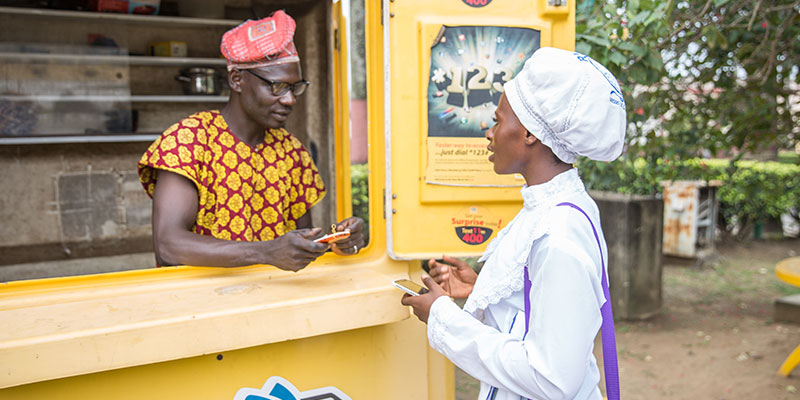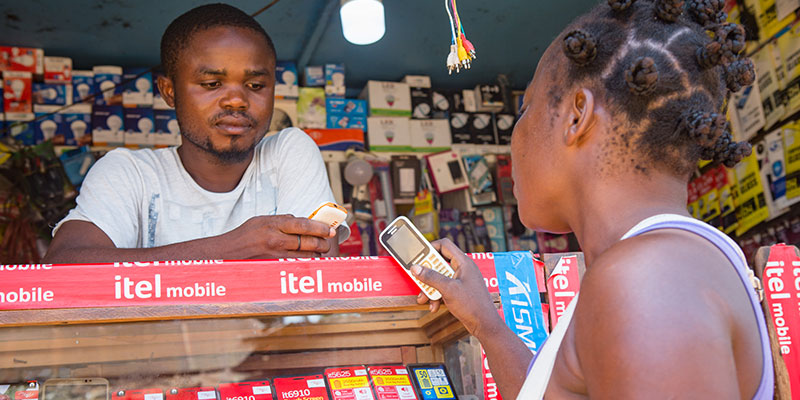The mobile industry has been steadily creating jobs in Sub-Saharan Africa. GSMA’s Mobile Economy Report for sub-Saharan Africa 2020 highlights that the industry employed over 2 million people directly and created employment for another 1.8 million people in the wider ecosystem in 2019. 1.4 million direct jobs were informal, in line with regional economic trends. GSMA’s Mobile Money metrics indicate that mobile money created employment for between 1.9 million (active) and 3.3 million (registered) mobile money agents.
The impact of COVID-19 on employment in the industry has been mixed. The World Bank confirmed a regional recession for 2020, and along with the International Labour Organisation and the International Growth Centre, noted the particular vulnerabilities and challenges that informal workers and businesses face in the region in light of the pandemic. However, the unprecedented acceleration of digitalisation in the region brought about by the pandemic has led to higher demand for data, mobile money and other digital services, decreasing the impact of macro-economic trends on mobile industry workers.
The GSMA is currently conducting extensive research funded by UK Aid from the UK government, focused on young people working informally in the mobile industry. The research examines the drivers, opportunities and challenges of informal youth employment in the industry and the impact that the pandemic has had on their livelihoods. Drawing on the research, this blog analyses the employment impacts of COVID-19 on prominent parts of the mobile value chain and provides our predictions for future employment trends in the industry.

There is high demand for skilled workers in mobile network operators (MNOs)
Formal employment within MNOs is likely to remain steady, and barring a few operations, there have not been significant COVID-19 related job cuts, though there were some hiring freezes. Our trends analysis suggests that while the business model is expected to remain lean and agile and MNOs will continue to work with partners and vendors in the larger ecosystem, there will be sustained demand for skilled labour in operations. In particular, advanced digital skills are needed to execute the digital transformation agendas of MNOs. Skills in product marketing, business intelligence, compliance and risk management, and human resources are also in high demand, and soft skills including analytical skills, critical thinking and professionalism are considered essential. As highlighted in the GSMA’s 2020 report on Youth Employment in the Mobile Industry in Sub-Saharan Africa, there is currently a wide skills mismatch. Governments, MNOs and higher education institutes need to collaborate effectively to provide targeted skills to young workers to enter the workforce in the telecommunications industry, while keeping job creation as an important priority.
COVID-19 enhanced the demand for content developers and creatives in auxiliary businesses
Beyond core business operations, the pandemic has accelerated demand for consumer digital content including music, gaming and videos on mobile devices. This has increased the need for local content developers and creatives, both in-house and with partners. The uptake in e-commerce, likely to be a long-term trend, will also expand digital opportunities for local entrepreneurs as well as opportunities in e-logistics. The rapid rise in EdTech and HealthTech initiatives that are increasingly being delivered through mobile devices will further enhance the demand for content and application developers.
A recent report by Google/IFC on application and content developers suggests that a majority of developers are young, self-taught or informally taught and under-employed. Young people need access to quality, accredited training in these sought-after digital skills, and this must be a priority area for governments who otherwise risk losing out on the immeasurable socio-economic benefits of a digital economy.

Informal workers in Sales and Distribution have been adversely affected
Current research and statistics from GSMA’s 2020 report on formal youth employment in the industry in Sub-Saharan Africa show that a majority of jobs created through the industry are in sales and distribution (S&D). This includes the sale of handsets and devices and digital products such as airtime, SIM cards and voice, data and entertainment bundles. A significant proportion of workers in S&D and handset repairs are informal and work in the open market; the pandemic has had a notable impact on their livelihoods. The challenges of being unable to sell products under lockdown and curfew conditions and the impact of lower consumer spending on products have considerably shrunk the incomes of informal workers in retail. However, with the continued demand for digital products, we expect this to be a short-term trend.
Planned investments in infrastructure will support formal and informal job creation
Infrastructure workers play a key role in the industry and perform an array of outsourced services such as field management of sites, riggers, fibre technicians, splicers and casual labour. Engineers and students with polytechnic training will continue to be in demand as operators plan to invest $52 billion in infrastructure rollouts between 2019 and 2025 despite the uncertainty brought about by the pandemic, as noted in the GSMA’s Mobile Economy in Sub-Saharan Africa 2020 report. The industry must remain proactive in ensuring adequate safety training and equipment for casual and contract workers in infrastructure, while governments need to ensure fair remuneration, adequate regulations and offer social protection for informal workers.

Growth in mobile money has increased the number of jobs in the region
Mobile money adoption rose consistently in the region over 2020, increasing the number of jobs created as mobile money agents. The GSMA’s much-awaited State of the Industry Report on Mobile Money launches on Wednesday, 24 March 2021 and will provide further details on the increase in mobile money agents in the last year. With the increasing adoption of mobile money in the region, we expect mobile money to continue to steadily create jobs in the coming years.
Mobile devices will increasingly facilitate employment through digital platforms
Enabled by better infrastructure and increasing access to mobile internet, one of the most notable developments in employment in recent years has been the rise of the digital ‘gig’ economy. While the industry does not directly create this employment, mobile phones are the primary technology through which workers can register for and obtain work through online platforms. According to Mercy Corps’ 2020 report entitled ‘Operating digital gig platforms in different regulatory environments’, there has been a rise in digital gig work in microtasks, ride-hailing, delivery and collection. Platforms are expanding to match jobs with workers in an array of industries.
For workers to reap the benefits of the digital gig economy, infrastructure hurdles such as the availability of electricity and network need to be addressed. Governments and policymakers must also urgently enact policies defining the rights and obligations and ensuring social protections and benefits for gig workers so that their employment conditions are fair.
Overall, while employment in the mobile industry in Sub-Saharan Africa was not immune to the economic shock of the pandemic, the increase in the demand for mobile and digital services has meant that the industry has shown resilience and will continue to employ people directly as well as enabling job creation in the wider ecosystem in the years to come, and increasingly via digital platforms.
The GSMA Mobile for Development (M4D) Central Insights Unit is an initiative supported by the UK Foreign, Commonwealth & Development Office (FCDO), the GSMA and its members.



